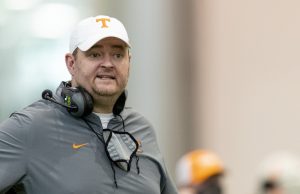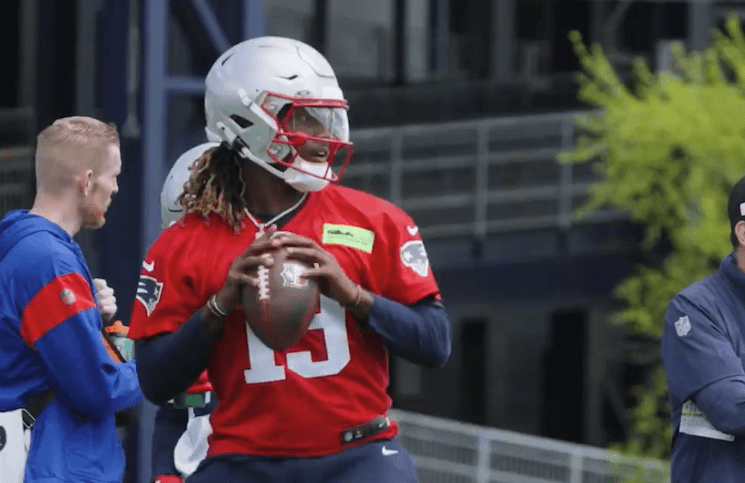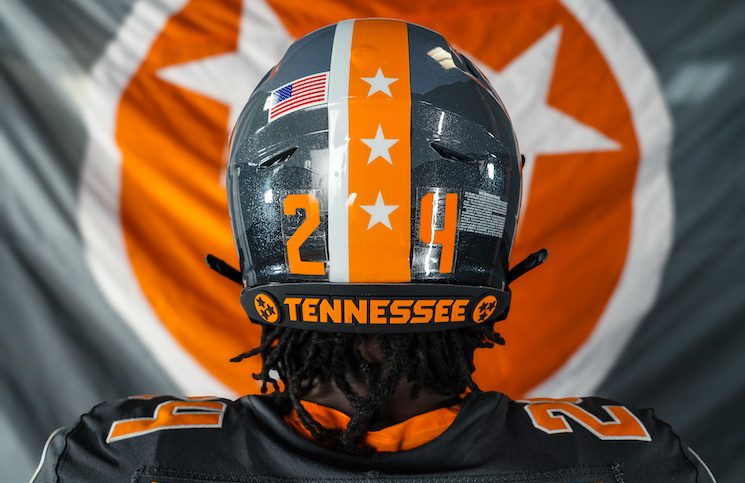
Tennessee head coach Josh Heupel had his third and final media appearance of week three on Thursday. After the Vols’ practice in the morning, Heupel spent about 12 minutes discussing some of his closing thoughts on the team before they welcome in Tennessee Tech (0-2) this Saturday.
The Vols’ week one game against Bowling Green was a promising start to the season. Tennessee’s finished the game with two 100-yard backs and was deemed the statistically fastest offense in college football through the first week. However, the Vols have found some trouble in the two weeks since. Both of Tennessee’s top running backs are questionable heading into week three. Meanwhile, quarterback Joe Milton is still recovering from an injury that saw him taken from the Pittsburgh game.
However, even with injuries and uncertain times, Heupel seemed to be in a great mood on Thursday. Heupel was lively talking about players like Jacob Warren and Princeton Fant, two tight ends he has been impressed by. In addition, Heupel spoke about his own experiences playing college football and how he translates that to his quarterbacks each week.
The full video for Tennessee head coach Josh Heupel’s Thursday week three press conference can be found here.
The Tennessee Volunteers will host Tennessee Tech this Saturday at noon ET.
Opening Statement
“Good Thursday walkthrough for us, energy and engagement was really good. I know you guys will have questions on injuries. A lot of that is going to be determined tomorrow and potentially on Saturday morning. The majority of it tomorrow based on how we get on the grass, how guys are moving around and functioning. Excited to go play, the guys are too. Like I said earlier in the week, the challenge is us. Big emphasis today for our players, the challenge of the last 48 hours is the process to get ready to go play. They’ve been good Monday, Tuesday, Wednesday. I like what they’ve done. They were good this morning, but later today and tomorrow is going to be important too. We’re learning how to do those things right as a program, coaches and players alike. So, with that, I’ll open it up to questions.”
On emphasizing the last 48 hours before the game…
“The message to them really has been about the things we can control. Some of that is during the course of play, things that we saw — penalties in particular and turnovers. Communication, small communication on the sideline, we’re in a 3rd & goal on the end zone, the structure of their defense is a little different, we end up walking into the end zone. Being able to come over and communicate, which we try to as coaches, make adjustments and incorporate it into the game. When I call the team up at the end of practice, are they engaged? Are their eyes looking at me? Are they really listening and hearing what’s going on? How you do anything is how you do everything. Those little things matter in a football game and they show up every single week. Those little things are things we have to improve on. The last 48 hours, which you have heard me emphasize a bunch, keeping what’s important, important. Players and coaches have family coming in, you get a chance to enjoy them, but man, you’ve got to flip the switch and get back into the football because it matters. It’s how you come down to pregame meal, it’s how you come down to what we call clap session, which is what we call our walkthrough before we watch the hype video and get on the bus. Those little things matter. The little things add up to winning. That’s why I’ve talked so much about the process here this week.”
On how he uses player feedback during the game and in the program…
“I do think it is important during the process of developing your program that players have ownership. We talk about great teams; it comes within the locker room. The accountability, the ownership, the standard of meeting the standard. I think you have to put kids in leadership roles. You have to give them opportunities to communicate, fail to communicate, learn how to communicate and be a part of the process too. There are non-negotiables inside our program. This is what it’s going to be. I think it’s important to let kids have some feedback and some things that can go one way or another. They take ownership in that and gives them a sense of being a part of the process. On gameday, the more veteran your club is, when I say veteran or mature, I’m not talking about if their a junior, a senior, a fifth-year guy, or sixth-year guy. I’m talking about their maturity as a player, their competitive composure, trust in what they see, and their ability to communicate. Absolutely you take things that they see on the field that you may see from the sidelines and be able to communicate when you come over to the benches. Then be able to make subtle tweaks or incorporate something into the ball game.”
On Jimmy Calloway’s growth and the next step for him…
“He grew as a wide receiver dramatically during the course of spring ball, missed a portion of training camp and is continuing to come back from that. He has all the attributes that we’re looking for. I think learning and continuing to grow in the understanding of how to play from the end of the previous play, from the whistle to the next snap is something he has to get better at. But we trust him in what he’s doing and believe that he has a really bright future as a player here.”
On how important Saturday’s game versus Pitt was for some of the younger members of the secondary…
“Players always want to play, first of all. To me, I think where you fail as a player is if your process changes from one week to the next. If you’re not completely engaged and go through the same routine of preparation on a Monday, on a Tuesday, on a Wednesday, on a Thursday, on a Friday. If you’ve got varying levels of engagement in how you prepare, then you’re setting yourself up for failure at some point. Our players clearly understand what the process should look like in preparing. They come in the building Monday. What does Monday afternoon look like for them when they have down time? What video should they be watching? The same goes for Tuesday and Wednesday. When you get later in the week, you’ve got tests, tips and reminders. That preparation has got to be consistent. That’s a part of the process that I’m talking about, how we can be better as players. In the defensive backfield, we want to be able to play more guys. Early in the year, I think you’re developing trust with players. That’s based on how they’ve played, how they’ve performed, how they continue to practice. Christian Charles is a guy who you saw play at a really high level on special teams during the first couple of weeks. He continues to get better. He’s a mature kid inside of our program. We want to see him, given the opportunity, go out and perform at a really high level in the secondary, but there are multiple guys like that.”
On if he envisioned that Jacob Warren and Princeton Fant would be guys that the team could rely on this season…
“We did believe they had the ability to be consistent, every-down players for us. Both of those guys prepare and work extremely hard at it. They spend a lot of extra time in the building in the afternoons, watching video. When we first got here and through the summer, coming in and getting extra signals, lining up going up and down the football field so that they can align and do their assignment. Some of those things led you to believe that they would play at a really high level. Again, for every player, the more you put into it, the more you’re going to get out of it. Those guys have put a lot into it here through spring ball, summer, training camp and they’ve played pretty well the first couple of weeks. There are things that both of them need to be and can be better at, but they’re going to continue to grow inside this offense and this program.”
On his assessment of Darnell Wright moving over to left tackle…
“I think he’s continuing to gain comfort and confidence playing the left side. We believe in him. He’s continuing to grow an understanding of what we’re doing. Fundamentally, has a lot of things he does really well. (He) can continue to get better in some of his pass sets consistency, but I like the effort that he’s tried to play with during the course of the first couple weeks.”
On where he would like to see the team grow from Week 2 to Week 3…
“The obvious thing is penalties. The next thing is turnovers. Those are both areas that we need to be better at as we get into conference play. You can’t lose the turnover battle every week. You’re not going to be successful. You can’t lose the field position (battle). You can’t change the way the game’s played, in particular on third down, with penalties. We’ve got to get better in those two areas.”
On how practice has been this week…
“Been really good. Guys have had great energy, focus. Love what they’ve done on the grass.”
On emphasizing the importance of special teams…
“Our team knows my expectations, that we win that phase every single week. We place an importance on it by what we do, starting every day when they walk in the building with special teams meeting. The extra time that we put into our practice, just the fundamentals and technique of it. When we break from walkthrough, the first thing we do is special teams fundamentals. Those skills all transfer over to what you do on offense and defense. We’ve got a lot of young players that have played at a really high level. Got some veteran guys that play (special teams). We’ve had NFL guys, and I’m talking about player personnel guys, come in here and talk about the fact is, if you’re not a first-round draft pick, you better be playing on special teams if you want to play at that level and show those guys those things. I think our team understands the importance of it. That’s showed up in the way that we’ve played for the most part. I think there’s a lot of young guys that have played with great effort and energy on those special teams, and coach (Mike Ekeler) and our staff, because our position coaches are all part of special teams too, are doing a great job with taking ownership in that.”
On Velus Jones Jr. making a bigger impact offensively …
“Velus is a guy that (we) really liked what he did through spring ball and had a really good summer. He got nicked up early in training camp and missed a lot of time. He’s coming back into the fold. As he continues to get healthy and continues to grow in some of the subtleties of how we operate. (We) want him to continue to grow and take more ownership in what we’re doing as we trust him more and more. You’ve seen his impact offensively, but on special teams as well, need him to continue to grow quickly.”
Transcript Courtesy of Tennessee Athletics Communications



